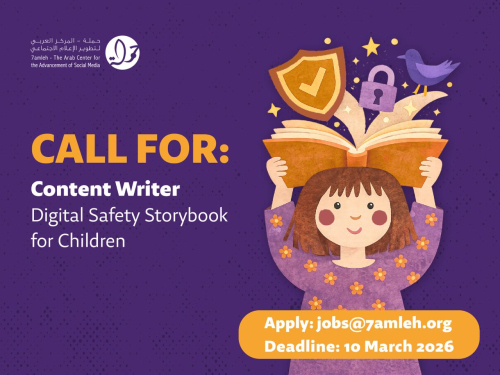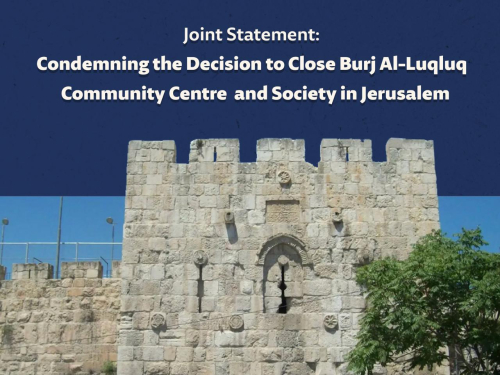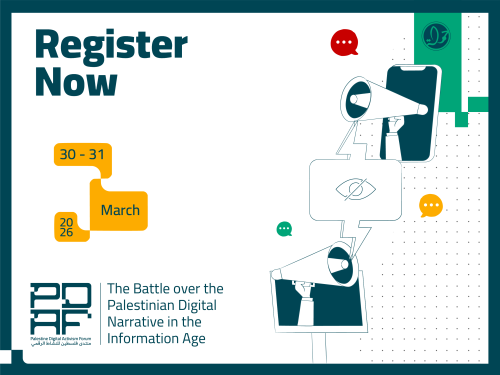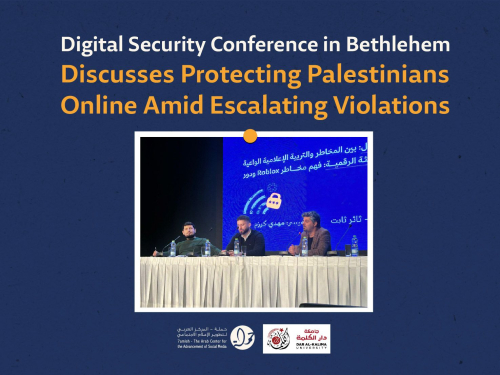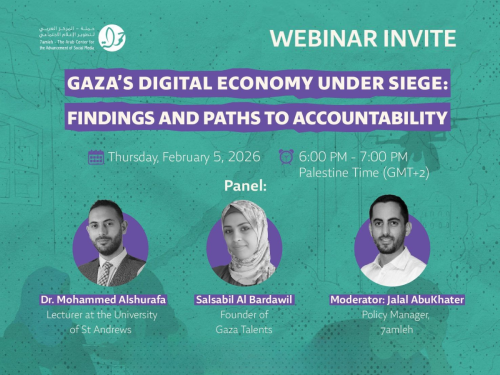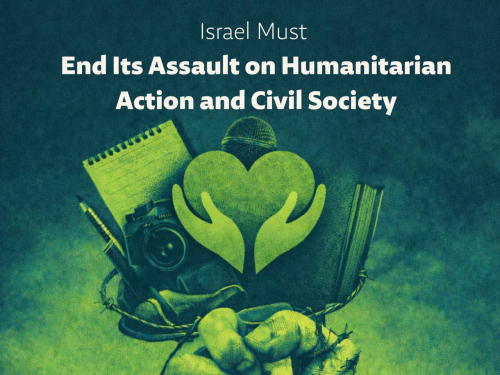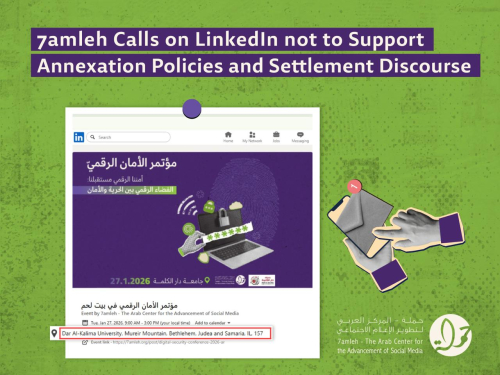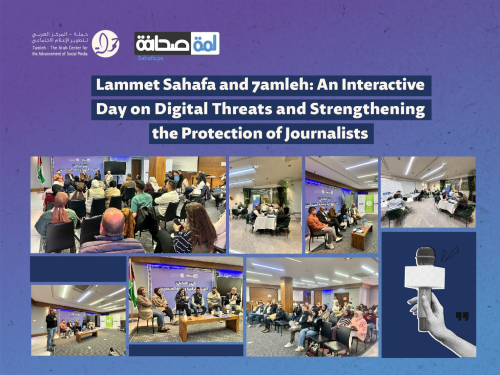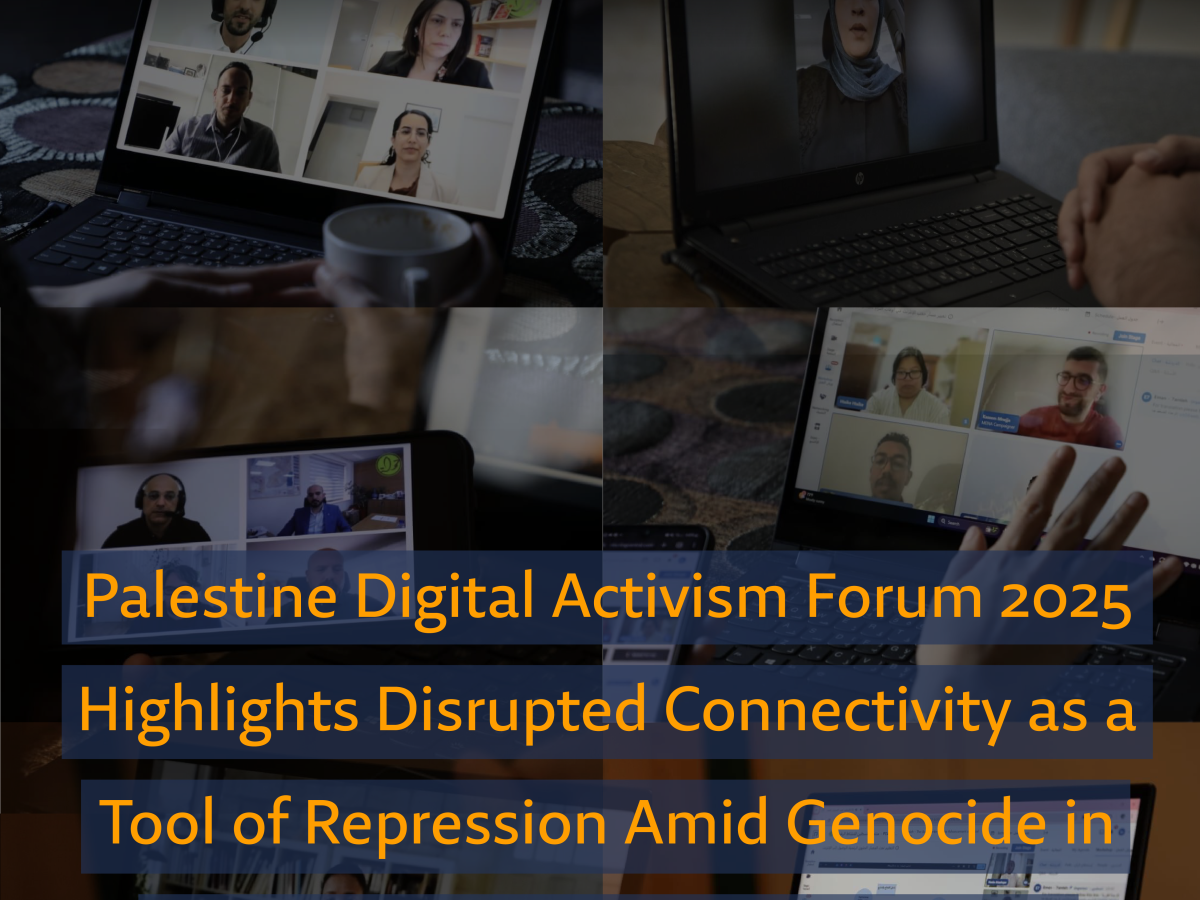
May 22, 2025, 7amleh – The Arab Center for the Advancement of Social Media concluded the ninth edition of the Palestine Digital Activism Forum 2025 on Wednesday evening. Held under the theme "Disconnected: The Impact of War on Internet Access and Palestinian Digital Rights," the forum was attended by over 900 participants from around the world, hosted more than 60 speakers and trainers, and was organized in partnership with over 50 local and international organisations.
Held virtually over the course of two days, the forum brought together digital rights advocates, legal experts, civil society representatives, journalists, engineers, and technologists to discuss the consequences of the forced digital blackout in Gaza. Discussions focused on the impact on education, healthcare, mental health support, and human connection, as well as strategies to counter digital censorship, technological violations, and institutional complicity in occupation and repression.
The first day featured high-level policy and dialogue sessions, including a special conversation with author and activist Naomi Klein. The discussion focused on the ongoing atrocities in Gaza, their global repercussions, and the urgent need to protect journalists.
Journalist Hind Khoudary from Gaza also shared her professional experience reporting under bombardment and amidst communication blackouts. Meanwhile, Irene Khan, UN Special Rapporteur on freedom of opinion and expression, addressed the destruction of Gaza’s telecommunications infrastructure and its effects on freedom of expression and access to information, stressing the responsibility of both governments and tech companies to uphold digital rights.
Engineer Ibtihal Aboussad spoke about her personal experience being dismissed from Microsoft after refusing to contribute to the use of AI as a military tool and part of the ongoing genocide. She called on tech workers to break the silence and resist digital repression.
The session focused on International Humanitarian Law and accountability. Dr. Mais Qandeel, Associate Professor of International Law, confirmed that the destruction of Gaza's digital infrastructure constitutes a blatant violation of international humanitarian law. Dr. Luigi Daniele ِAssociate Professor in International Law emphasized that the imposed digital siege denies civilians their right to life and communication.
The first day concluded with the announcement of the PDAF 2025 Award, which honoured journalists and content creators in Gaza in recognition of their courageous efforts to convey the truth despite bombardment, blackout, and blockade-affirming that truth cannot be buried beneath the rubble.
On the second day, the forum hosted a series of specialized parallel training workshops in collaboration with local and international institutions. Topics included digital verification tools, countering disinformation, digital privacy, human rights, and education under siege, as well as exploring the use of technology for documentation and justice.
Among the workshops was “Resilience in the Digital Age,” which discussed the challenges faced by independent journalists in Gaza due to repeated blackouts and their impact on safety and livelihoods. The "Navigating Mobile Connectivity” session highlighted the complexities of Gaza’s telecom infrastructure and presented the Gaza Online initiative and e-SIM technology as innovative solutions to sustain communication despite blackouts.
The “Gaza in the Virtual World” workshop, organized in collaboration with ARIJ and led by journalist Rawan Damen, explored ways to support journalists and fact-checkers in combating disinformation and amplifying the Palestinian narrative globally. “The Power of Proof” session showcased documentation tools such as the eyeWitness to Atrocities app and Tella platform by HURIDOCS, which help human rights defenders safely and effectively document evidence in low-connectivity environments.
The “Education Under Siege” workshop, held in partnership with Birzeit University, Tamer Institute for Community Education, and EduPro, addressed the devastation of educational institutions in Gaza and its impact on the right to education and internet access. The session also examined grassroots educational initiatives, the psychological effects of digital isolation, and the importance of recognizing education as a fundamental digital right that cannot be separated from other human rights.
As part of the Forum’s activities, two dedicated workshops were organized in-person for university students. One was held at Birzeit University under the title “Self-Censorship on Social Media Platforms,” aiming to raise students’ media awareness and encourage public discussion around freedom of expression in the Palestinian context. The second workshop was held at Bethlehem University under the title “Online Freedom and Mental Health,” and highlighted digital rights and the impact of digital isolation on mental well-being. Other sessions covered essential topics such as the impact of digital blackouts on artists, gender-diverse groups, and the role of Big Tech in enabling digital repression.
The ninth edition of the forum served as an open space for dialogue, learning, and building solidarity. It also offered an opportunity to develop just digital policies that serve Palestinians, protect freedoms in digital spaces, and confront digital discrimination and institutional complicity.
Related Articles
Subscribe to Our Email Alerts
And stay updated with our latest activities, news, and publications!

